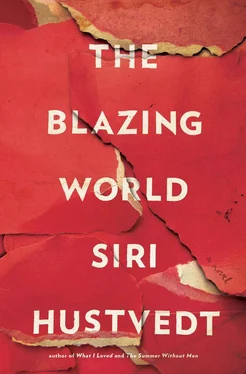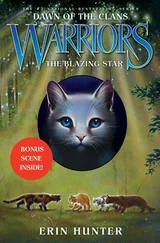I’m not sure Harry really liked the thing she bought by Rune — the video screen with faces cut to bits and put back together again, a movie mishmash of glamour and gore. It was a multiple — which meant “not that expensive.” One afternoon, I parked myself in front of the screen and gave it a yeoman’s try. “Let me be fair,” I said, “and not loaded with prejudice just because the artist is an asshole. T. S. Eliot was no paragon, was he? Are these bloody mugs and sliced cheeks any good? Am I interested? Do I care?” To be honest, the darned thing stumped me. I told Harry it made me feel lonely, and she laughed, but then she said it made her lonely, too. “It’s not about communion,” she said. I didn’t know at the time that Rune was ripe to be her last stand. In her head, he was vehicle numero uno. If she could harness his star power, she could prove how the machinery worked, how ideas of greatness make greatness, and once she had triumphed, the great unmasking would take place! Harriet Burden, her own woman.
And so we two, Harry and Bruno, duked it out and then made it up in our domains in Red Hook, one grand, one puny, but each domicile reliable in its own way. Around us the city buzzed and screeched, and the foghorns blew, and the clouds moved overhead. It rained and it thundered and then it brightened, and the seasons changed. But every day the sun rose, and the sun set, and when we stepped outside, the street was there, and Harry’s truck was there, and the Manhattan skyline was there. And then New York City was slammed from the outside. From blue sky to smoking sky in minutes — we heard the second plane, low and loud, and we saw it hit. We saw it again on television. I tried to understand it, but I couldn’t. I knew and I didn’t know. Once we had found out that Maisie had retrieved Aven from kindergarten at the Little Red School House on Sixth Avenue in the West Village, that Oscar had not had to travel to Brooklyn that day, that Ethan was in his apartment in Williamsburg, that my daughter Cleo, the only Kleinfeld offspring who lived in New York, was indeed in her office in the Brill Building in Midtown, that Phinny and Ulysses and the Barometer had not yet budged for the day, we watched through the window as the winds carried the diseased dust and debris over Red Hook. We shut the windows against the unspeakable stench, and spent much of the early afternoon tending to the Barometer. The man’s cosmological delusions bumped and lurched this way and that in ordinary weather. The smoke, the explosions, the falling papers, pulverized plastic, and flesh tipped him into a state of nonstop gibberish and stiff, machine-like gestures. With his wild hair and beard, his dirty Grateful Dead T-shirt, and his torn khaki pants that hung about his bony, bowed legs, he expounded mechanically about the “groaning sublimity of transportable tempers and their combustible storm-patriots romping in divine intercourse with God’s archangels” (excerpt from P.Q.E.’s tape. The Barometer’s language is impossible to remember). I prayed. I prayed he’d shut up. The carnage meant nothing to the Raver. Mass murder didn’t touch him. He was lost in his own power fantasies of control, which the day had exploded or confirmed (I’m not sure which). Ulysses produced a Xanax, which we eventually managed to cajole him into taking. We put the nut job to sleep.
Ladder 101. All seven firefighters who answered the call died.
Days later, I remember Harry at the window. She made a low noise that came from her chest, not her mouth. Then she said, “Human beings are the only animals who kill for ideas.”
When I think back, I realize no one I knew lusted for vengeance. For a period of weeks, it seemed to me that nearly every New Yorker who was still alive became a saint. We spoke to strangers on the subway and asked them, “Are you okay?” meaning “Did you lose anyone?” We donated shovels, clothes, flashlights. We lined up to give blood, even though that blood turned out to be useless. You had either died or you had survived. Rune grabbed a camera and filmed guerrilla-style. The area was cordoned off, but he must have wormed in past the cops. I know he called Harry. She worried aloud about his lust for photos. Did the mentally sick get sicker after September 11? There must be some goddamned report on it out there somewhere.
Most New Yorkers comported themselves like angels, but the pundits, commentators, and journalists yapped their pieties, waved their clichés, and brandished their platitudes. And in the years that followed, Bush and his cronies erected one big lie after another over the incinerated corpses in lower Manhattan. Soaring collective goodness can’t last. We regressed to our sniping, smart-mouthed, but also intermittently kind and helpful selves and, because one day after another came and went without a subway explosion, bridge collapse, or skyscraper meltdown, we were lulled back to what Warren G. Harding called “normalcy,” code for just-the-regular-day-to-day-crap-life-offers, thank you very much: work doldrums, adulterous affairs, family squabbles, all manner of neuroses, asthma, stomach ulcers, rheumatisms, and acid reflux.
When Harry told me not long after the attacks that Rune had agreed to take a turn as the last actor in her grand tripartite scheme, I burst out with a big why-the-hell-would-he-want-to-do-that? Harry’s reasoning was bollixed up by her wishes, but it had various strands. The subterfuge was right up Rune’s alley, a ploy that wowed him because, if it all went as planned, he could become the biggest art world kidder of them all. He would expose the critics (some of whom he hoped to draw and quarter) as clowns. This was the man’s vulnerability, Harry claimed. There were those who called him a con artist, a panderer. Plus the market scared him. Up one day, down the next. He didn’t want to go the way of Sandro Chia, dumped on the market by Saatchi, never to recover. Rune lived like a pasha, indulged himself; he needed upkeep. He would turn the tables on his naysayers. When they mocked his latest, he could produce Harry to confound them. But she also claimed that she had wrenched the great Rune’s thoughts, remade his inner world, and that the horrific event downtown had exploded his plotline. It didn’t work out like that. In the end, the simpleton Bruno knew more than the Grande Dame of irony.
What does a woman want? What did Harry want? She did not want to be Rune. She did not want to sell her work for millions of dollars. She knew the art world was mostly a stink hole of vain poseurs who bought names to launder their money. “I want to be understood,” she would wail at me. Hers was a heady game, a philosophical fairy tale. Oh, Harry had explanations, justifications, arguments. But I ask you, in what world was this understanding going to take place? In Harry’s magic kingdom, where the citizens lounged about reading philosophy and science and arguing about perception? It’s a crude world, old girl, I used to tell her. “Look at what’s happened to poetry! It’s become quaint, cute, and ‘accessible.’ ” Harry wanted her pseudonymous tale to be read by illiterates. Obsession is what she had, and obsession is a machine that grinds and clanks and hisses hour after hour, day after day, month after month, year after year. She hated my poem. I hated her fairy tale. She built Rune a magnum opus, a maze of her own private dance of grief, and he stole it. When she told me he wasn’t going to go through with her plan, she was flat on her back in her studio ogling a big, fat lady with forceps and a cowbell she had hung from the ceiling. Edgar and two other assistants, Ursula and Carlos, had gone home. It was about six in the evening. She had called me a few minutes before. “Come over, Brune. Something’s happened.” Her voice, hurt and faltering. She didn’t look at me once while the story rolled out of her, word by word, slowly, deliberately. Only her mouth moved. The rest of Harry had turned into a rock.
Читать дальше












